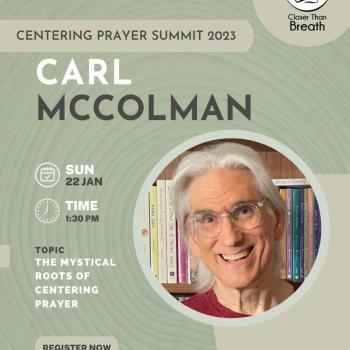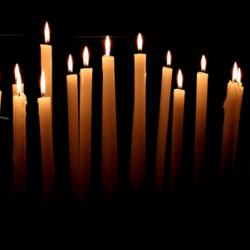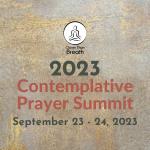One of the patrons of this blog wrote to me recently:
My question is, how do I meet other Christian mystics?
Thanks for asking. It’s a question many of us ponder. Even though there is a long tradition of regarding mysticism as “the flight of the alone to the Alone” (in the words of Plotinus), it’s been my experience that many of us “aloners” nevertheless seek out the company and fellowship of others who are undertaking similar spiritual journeys.
Indeed, this is probably why religion emerged in the first place. Today so many people reject religion (“I’m spiritual but not religious”) because we see how the big religious institutions can be oppressive to people who don’t fit in, and often seem to promote a kind of lowest common denominator of spiritual practice that leaves little space for intellectual curiosity or the importance of personal experience. Just the other day I came across a video on Youtube created by an evangelical church not far from where I live, warning of “the Dangers of Christian Mysticism.” But the person speaking — a young and no doubt very earnest pastor — said nothing about the beautiful tradition of mystical Christianity (he never mentioned any of the great mystics of the past); instead he just kept insisting that because Christians have the Bible, we should not try to foster any kind of personal spiritual experience! To his mind, faithful Christianity was an entirely intellectual exercise of obeying the external authority of the Bible, and therefor remaining uninterested in any possibility of a living encounter with the Holy Spirit within (he was upset about several popular, contemporary books about near death experiences because he saw them as “unbiblical”). Hmmm, no wonder so many young people opt for “I’m spiritual but not religious”!
But back to my patron’s question. Even though many people of our time reject the alienating institution, that doesn’t mean we no longer desire authentic community. Even introverts like myself want to be connected with kindred spirits. But the question remains: especially given the problem I have just outlined (that Christianity in its institutional form often seems indifferent, if not hostile, to mystical spirituality), how do we go about finding one another?
I think to answer this question we have to remember the principle that “a mystic is not a special kind of human being, each human being is a special kind of mystic.” So it’s not just a matter of finding the mystics; it’s a matter of finding mystics that you feel like you can truly relate to.
So perhaps the first step is getting to know yourself. What kind of mystic are you — or do you aspire to be? Are you drawn more to the theology and philosophy of mysticism: the soaring intellectual thought of deep thinkers like Meister Eckhart, John of the Cross, or Bernard of Clairvaux? Or do you simply seek a more heartfelt, deeply devotional encounter with the presence of God, similar to the experience of Teresa of Ávila, Julian of Norwich, or Thérèse of Lisieux? Are you interested in an interfaith approach to mysticism (like Thomas Merton), or the interface between mysticism and science (Pierre Teilhard de Chardin)? Are you more drawn to silent forms of prayer (like Centering Prayer), or do you want your interior life to be rich with imaginative reflection (like Ignatian Prayer)?
And, yes, are you comfortable operating within the structure of the institutional church (whether Orthodox, Catholic, Anglican, Protestant or Evangelical), or are you more of what is increasingly known as “spiritually independent”?
Taking the time to know your personal mystical “style” is helpful for anyone seeking to meet other contemplative and mystical seekers, since for most of us we probably want to find kindred spirits: that is to say, people whose faith journey is similar, at least in some ways, to our own.
Now, for some practical thoughts. I had a mentor years ago, Kenneth Leech, who discouraged me from calling myself a mystic. His logic was elegant in its simplicity: a mystic is like a saint, one of the characteristics of being either a saint or a mystic is true humility (self-forgetfulness), so it’s more important to simply be a mystic rather than to identify yourself as such. If you are a true mystic, Leech resigned, others will see it in you; let them call you a mystic.
What this means, paradoxically, is that the best way to find other mystics is not to go looking for people who identify themselves as such! The mystics in your community probably are flying under the radar: they are living a mystical life, but doing nothing to draw attention to themselves. So one of the ways we find mystics is by getting to know what mystics do.
What Do Mystics Do?
In my forthcoming book (The New Big Book of Christian Mysticism, coming out in August), I have a chapter called “Living a Mystical Life” where I attempt to answer this question. Just like there’s many different ways to be a mystic, there are many different practices that mystics do. I list twenty such practices, including lectio divina, Centering Prayer, and cultivating deep interior silence, to name just three. Indeed, most of the practices revolve around prayer in some form or another. That’s for a very simple reason: the heart of mysticism is union with God, and the key to intimacy with God is prayer. So I think my first practical piece of advice in response to the question “How do I find other mystics” is to say, look for people who are serious about prayer, meditation and contemplation. And I would specify that meditation and contemplation (which, in a Christian context, are forms of prayer) are important keys to finding the mystics in your midst. The controversial theologian Matthew Fox once said “Prayer is not saying prayers.” I would edit that slightly: for mystics and aspiring mystics, prayer is far more than just “saying prayers.” Prayer is a way of life. Prayer is a posture of deep, abiding, attentiveness and receptivity to the Spirit within (see Romans 5:5). So you might need to dig deeper than just your local church’s intercessory prayer group. Nothing against intercessory prayer — it’s a beautiful way to express care for others while seeking intimacy with God. But meditative and contemplative prayer go far beyond just asking God for stuff, even if on behalf of other people.
So we can refine our question: where do we find people with a deep, stable and ong0ing commitment to a life of prayer, meditation, and contemplation? Because such people are probably not going around calling themselves mystics, and yet they are the ones who mostly likely embody what the mystical life is all about.

Let me suggest seven possible places where such people are to be found.
- Monasteries (and Monastic Associates and Oblates). Monastic culture is not everyone’s cup of tea, but if you are drawn to it, you’ll probably meet other people with a similar interest in mysticism and the mystics. Not all monasteries are Catholic or Orthodox, although most are; but you can find monastic communities in the Episcopal and worldwide Anglican churches, and even “Neo-monastic” groups that are evangelical or non-denominational in nature. Monasteries, convents, and neo-monastic communities typically value silence and contemplation and recognize that prayer is central to the spiritual life. You don’t have to join a monastery or convent to benefit from their deep spirituality; of course, some of us are called to the monastic life, so if you feel that tug in your heart, you might want to explore it in a patient and unhurried way. Meanwhile, many monasteries and convents sponsor associate groups or oblate groups which are communities of laypeople, non-monastics, who gather on a regular basis for prayer, study and fellowship. A community like that can be a veritable mothership of humble contemplatives. Many (but not all) such groups are ecumenical in spirit, so you don’t necessarily have to be a member of “the right” church to participate, but that is something to look for when seeking out monastic-affiliate groups.
- Retreat Centers. Think of monasteries and convents as spiritual resource centers; they have a residential community that forms the heart of their worship and community. For you can also find retreat centers without a residential community of monks or nuns, but still function as destinations for contemplatives and aspiring mystics. Many such retreat centers are affiliated with religious orders like the Jesuits, or are sponsored by churches, or sometimes even are independent/ecumenical. Retreat centers may or may not have affiliated communities like an associates group; the easiest way to connect to a retreat center is to simply go on retreat (something that aspiring mystics and contemplatives ought to do on a regular basis). Retreat centers can also be places where you can connect with a spiritual director (see below). One example is Ignatius House, the Jesuit retreat center in Atlanta, but there are many others so look for one near you.
- Centering Prayer Groups. The problem with both monasteries and retreat centers is that you may have to travel a significant distance to get there, and the people you meet may all live far away from you. How do you find mystics and contemplatives in your own neighborhood? Perhaps the best way is to seek out a Centering Prayer group. Under the auspices of Contemplative Outreach, Limited, these volunteer-run groups exist to help individuals deepen a stable and daily practice of Centering Prayer, a deeply silent form of prayer that is intended to prepare us for the gift of contemplation. If you are not familiar with Centering Prayer, see if there is an introduction to Centering Prayer workshop taking place near you: such workshops are usually sponsored by local Centering Prayer groups. Such groups typically meet weekly or biweekly and include time for silent prayer, for shared discussion over a contemplative book or video, and instruction and guidance for beginners. Visit the Contemplative Outreach International website to learn more, and check to see if there is a local chapter near you. There are also Centering Prayer groups online that you can participate in.
- Christian Meditation Groups. Similar to Contemplative Outreach, the World Community for Christian Meditation offers similar resources in terms of local groups, training programs, and retreats. CO follows the teachings of Thomas Keating, while WCCM follows the teachings of John Main and his successor, Laurence Freeman. Centering Prayer and Christian Meditation have slightly different methodologies, but their similarities run deep: they are both forms of meditative prayer that foster deep interior silence through the intention of consenting to God’s presence within. Again, visit the WCCM website to learn more and/or to find a group near you.
- The Quakers. Many local faith groups have resources for supporting contemplative prayer and practice, but I feel like giving a special shout out to the Quakers (the Religious Society of Friends), because of the tradition of worshiping in silence, and seeking the voice of God within. Like so many Christian churches the Quakers have both liberal and conservative communities, so find the flavor that you feel most at home with. Check out www.quaker.org to learn more, or seek out a Friends community near you.
- Spiritual Directors. A lot of people drawn to contemplation and mysticism are introverts, and perhaps may find that meeting an entire group of folks can be a bit overwhelming. You might want to seek out just one person who can be a formal companion for your journey into the mysteries of the divine presence. In Christianity, like other faith traditions, there is a long tradition of one-on-one spiritual guidance, mentoring, and/or companionship, that falls under the umbrella of spiritual direction. It’s not the same thing as a guru; for Christians, the ultimate “director” of our faith journey is the Holy Spirit, so any human being we turn to for support and guidance serves as a “co-listener” who seeks to find the Holy Spirit’s activity in your heart. An organization called Spiritual Directors International can help you locate a spiritual director near you (note that SDI is an interfaith organization, but you can specify a Christian spiritual director when searching their database). And as I mentioned above, many monasteries and retreat centers also have spiritual directors/companions in their networks that they can refer you to. Like mystics in general, spiritual directors come in many “flavors” — depending on their church affiliation, their background (Jesuit, Benedictine, ecumenical), and where they were trained. So you may need to speak with several spiritual directors and companions before you find the one you truly resonate with. Note that spiritual direction is a more formal relationship, so this is probably not someone you will pal around with. But a spiritual director probably would no local activities and resources where you could meet other like-minded contemplatives and mystical seekers.
- Online Communities. Finally, let’s not underestimate the beauty and power of online resources, including websites, blogs, social media groups, and membership communities where you can meet kindred spirits. My own Patreon community is evolving into a small but meaningful tribe of contemplative seekers; another, larger example would be Closer Than Breath, a membership website for contemplatives. Groups on Facebook are typically free to join, but as you know social media can be a free-for-all. So like in any other aspect of your life, use common sense and discernment when connecting with others who share interests in common with you.
I know this was a lot of material (I’ve never been very good at writing just a 500-word blog post!) but I hope it gives you a few useful ideas for connecting with your “tribe” of fellow mystics, aspiring mystics, contemplatives, lovers of silence, and seekers of the divine presence. I’ve met so many wonderful people in the contemplative community over the years, so I trust you will too. Enjoy the adventure!


















